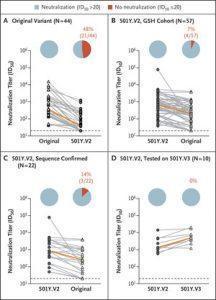In the last half of 2020, multiple episodes of SARS-CoV-2 reinfection were reported and were initially attributed to the induction of low immune responses that did not protect against reinfection. However, in October 2020, researchers reported the emergence of a new SARS-CoV-2 variant: B.1.351 (501Y.V2) that contained multiple mutations within the antibody epitopes of key neutralizing antibodies within the receptor-binding domain, an immunodominant region of the SARS-CoV-2 spike (Tegally et al., 2020). Following this, researchers demonstrated that the B.1.351 (501Y.V2) variant escaped neutralizing immunity induced by the initial SARS-CoV-2 variant (501Y.V1), which could lead to reinfection. These findings have implications for vaccine roll-out (Read: The antibody response to SARS-CoV-2 501Y.v2 variant and vaccine implications).
Does immunity induced by the B1.351 (501Y.V2) variant offer cross-reactive immune responses against other variants such as the 501Y.V2 (P2) variant first detected in Brazil? A recent article by Moyo et al., 2021 demonstrated that 501Y.V2 elicits robust neutralizing antibody responses against both the original variant and 501Y.V3 (P.1), which indicates high levels of cross-reactivity. Our data indicate that vaccines built on the spike protein of 501Y.V2 may be promising candidates for the elicitation of cross-reactive neutralizing antibody responses to SARS-CoV-2.
Watch the video below for a summary of the results shared in the article.
Video by Thandeka Moyo-Gwete
Journal Article: Moyo-Gwete et al., 2021. Cross-Reactive Neutralizing Antibody Responses Elicited by SARS-CoV-2 501Y.V2 (B.1.351). NEJM
Summary by Cheleka AM Mpande











